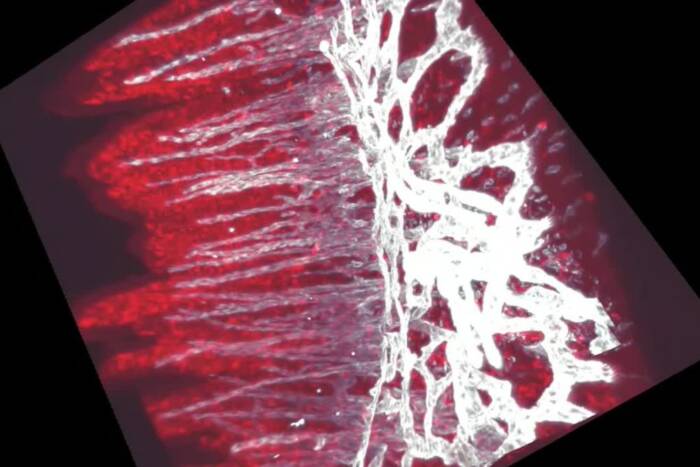New science outreach director aims to show students it’s cool to be nerdy
by LESLIE CHURCH
The first goal of the Science Outreach Program’s new director is to squash the stereotype that all scientists have Albert Einstein hair and socially awkward personalities. She won’t have to look hard for evidence: she herself is living proof. Jeanne Garbarino, who was named director of the university’s longstanding program to introduce high school students to real-world biological research, has been a postdoc in Jan L. Breslow’s Laboratory of Biochemical Genetics and Metabolism studying intracellular cholesterol transport since 2008. She has very neat hair and is quite personable.
“One of my passions is to get girls more involved in STEM [science, technology, engineering and math] fields. A lot of times their interest tapers off in middle school, and I’m hoping we can use Rockefeller’s outreach programs to bring them back, show them the many impressive role models right here on campus,” Dr. Garbarino says. “Show them that it’s cool to be nerdy.”
The university’s Science Outreach Program brings high-achieving high school students and interested K-12 teachers to Rockefeller’s labs for a total immersion, hands-on introduction to research for seven weeks in the summer. Participants are matched with a mentor in the lab who guides them through all aspects of conducting research, and by the end of the program many students have helped to discover something that was previously unknown. Ted Scovell, the program’s previous director, left this summer to return to teaching.
Dr. Garbarino’s own nerdy inclinations took her from a B.S. in biology at SUNY Geneseo to a Ph.D. in nutritional and metabolic biology at Columbia University, but it was not without its challenges. Dr. Garbarino grew up in the Bronx in a blue-collar family — her parents have both been ticket sellers for Metro North since she was 10 — and was the first person in her family to go to college.
“I realize how important it is for young people to have role models in those schools that don’t have the same resources as the elite schools do,” Dr. Garbarino says.
Having first-hand knowledge of life in academia opened Dr. Garbarino’s eyes to the challenges faced by students at the graduate level, too — challenges she hopes to address at Rockefeller in her new position.
“Graduate students need more communications training,” says Dr. Garbarino. “They need to be able to give an elevator pitch about their research in a way that’s exciting and understandable. Being able to communicate effectively is a skill that can be used in whatever career they decide to go into. Plus, the more we share our work, the more we can make science a part of everyday discussion in society.”
Dr. Garbarino’s résumé boasts an array of such experience, and it all started with a job writing for Natural Selections, the university’s student-run publication. From there she started a blog called The Incubator with another postdoc and a graduate student, which led to her own blog, The Mother Geek, and to a job as an editor at Double X Science, a Web site where Dr. Garbarino writes evidence-based science stories geared toward women and mothers. Her popular “Pregnancy 101” series, for example, includes hand-sketched diagrams explaining the science of how a pregnancy test works. Dr. Garbarino has gigs blogging for Scientific American, Nature and The Huffington Post, and she is codirector of two science communication initiatives on campus: the Science and Media Lecture Series and SpotOn NYC, which brings together scientists and media professionals from around the city to discuss how science is communicated online.
“Jeanne is a skilled scientist, and has also been consistently involved in science communication, education and outreach,” says Sidney Strickland, vice president for educational affairs and dean of graduate and postgraduate studies. “Her scientific experience and enthusiasm for thinking about science education in new and innovative ways will greatly benefit the Outreach Program.”
Dr. Garbarino plans to channel her communication experience into new outreach initiatives, like resurrecting The Incubator blog and inviting students and postdocs to write about research, policy and any other science topic that could strike up an online conversation.
“I want to encourage students here to get as involved as they can — they can start a blog, speak to classrooms, judge a science fair, discuss science on social media — the more faces we have representing science, the easier it is to debunk the stereotypes.”



